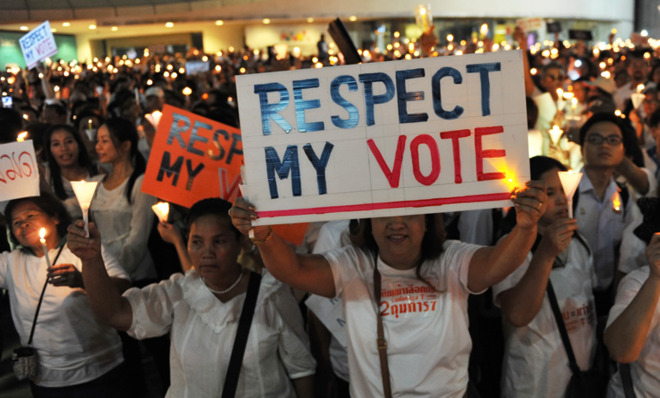Is Thailand on the verge of splitting up?
The country's principal factions can't seem to agree on anything

A free daily email with the biggest news stories of the day – and the best features from TheWeek.com
You are now subscribed
Your newsletter sign-up was successful
A months-long political crisis in Thailand has shown no signs of abating, as elections this weekend were met with a boycott by the country's main opposition party, protests, and escalating violence.
The government of Prime Minister Yingluck Shinawatra, of the Pheu Thai Party, has accommodated the opposition Democrat Party as much as can reasonably be expected, dissolving parliament and scheduling elections in a bid to diffuse the crisis. There's only one problem: the Democrat Party isn't popular enough to win a national election, and knows it.
Indeed, the opposition has taken to calling the elections the "same old power grab." It has gone beyond a mere boycott to shut down numerous polling locations across the country. And in a profoundly undemocratic move, it has called for the creation of an unelected "People's Council" to run the country.
The Week
Escape your echo chamber. Get the facts behind the news, plus analysis from multiple perspectives.

Sign up for The Week's Free Newsletters
From our morning news briefing to a weekly Good News Newsletter, get the best of The Week delivered directly to your inbox.
From our morning news briefing to a weekly Good News Newsletter, get the best of The Week delivered directly to your inbox.
The Democrat Party views Yingluck, who was rightfully elected in 2011, as a puppet for her brother, former Prime Minister Thaksin Shinawatra. Thaksin and his party have been accused of myriad crimes, including corruption, authoritarianism, treason, conflicts of interest, and suppressing the media. But the Democrats have been unable to win over a majority of Thais, many of whom revere Thaksin for policies that seek to lift up the poor. As a result, the Democrats have been consigned to a seemingly permanent minority status.
The two sides are as far apart as ever. Barring a military coup, it seems the Thai government will remain in a state of paralysis. The deadlock has sparked speculation that Thailand could end up splitting in two, with the Pheu Thai Party retreating to its stronghold in the largely rural north, and the Democrats taking over the more cosmopolitan south, which includes Bangkok.
Some in the north have already embraced the idea of a political separation. In Chiang Mai, a former classmate of Thaksin told The Economist, "We want our separate state and the majority of the red shirts [the Pheu Thai Party] would welcome the division."
But in fact, there are several obstacles to Thailand getting a divorce.
A free daily email with the biggest news stories of the day – and the best features from TheWeek.com
First, what would happen to Bangkok? History is rife with divided capitals, and the case of Bangkok is no different. It's the seat of government in Thailand, and the central entry point for the country's all-important tourism industry. While the country's partisan lines largely coincide with geographical lines, Bangkok would necessarily be contested ground.
Another factor against secession is the fact that the government is a constitutional monarchy. While there have been 20 coup attempts since 1900 — 11 of which have been successful — Thailand's monarchy remains a strong, unifying force. King Bhumibol Adulyadej is the world's longest-serving living head of state, and is revered throughout the country. He also has the support of the army, another institution that is seen as being above the fray of Thailand's fractious politics.
And the notion of a Thai national identity goes far beyond state institutions. Ever since the Siamese coup d'état of 1933, the Thai government has enacted policies to encourage "Thaification" — that is, a nationwide proliferation of Central Thai culture. Thaification included efforts to strengthen ties between Bangkok and the rest of the country, and to foster a sense of nationhood by mandating a twice-daily broadcast of the national anthem, for example. Indeed, both the Pheu Thai Party and the Democrat Party are fiercely loyal to the idea of the Thai nation.
Finally, a separation would result in two unequal nations, economically speaking. As the geographic division currently stands, the Pheu Thai Party would inherit a substantially poorer country than the opposition. For all the benefits of leaving behind the pesky Democrats, that prospect can't be too attractive to the Shinawatras.
-
 Minnesota's legal system buckles under Trump's ICE surge
Minnesota's legal system buckles under Trump's ICE surgeIN THE SPOTLIGHT Mass arrests and chaotic administration have pushed Twin Cities courts to the brink as lawyers and judges alike struggle to keep pace with ICE’s activity
-
 Big-time money squabbles: the conflict over California’s proposed billionaire tax
Big-time money squabbles: the conflict over California’s proposed billionaire taxTalking Points Californians worth more than $1.1 billion would pay a one-time 5% tax
-
 ‘The West needs people’
‘The West needs people’Instant Opinion Opinion, comment and editorials of the day